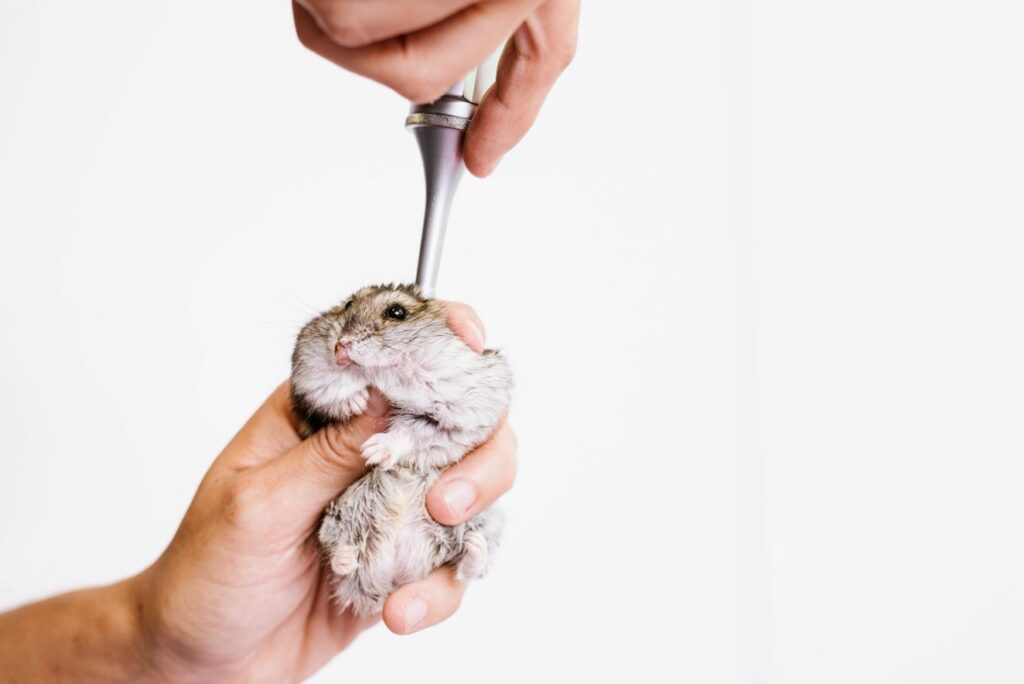Hamsters are beloved pets that bring joy and companionship to many families. As with all living creatures, hamsters age and require special care as they get older.
It’s important to recognize the signs of old age in hamsters and adjust their care to ensure they live out their golden years in comfort and happiness. In this blog post, we’ll explore the signs of old age in hamsters and provide tips on how to care for them.

Signs of Old Age in Hamsters
As hamsters age, they may experience a range of physical and behavioral changes that require attention and care. Here are some common signs of old age in hamsters:
Decreased Activity Levels
Older hamsters may become less active and spend more time sleeping or resting. While some decrease in activity is expected with age, a sudden or drastic change in behavior may be a cause for concern.
Loss of Appetite
Older hamsters may lose their appetite or become more selective in their food choices. This can lead to weight loss and other health issues if not addressed.
Weight Loss
Weight loss is common in aging hamsters and can be a sign of underlying health issues. Regular weigh-ins can help monitor changes in weight.
Decreased Grooming
Older hamsters may have a harder time grooming themselves or may stop grooming altogether. This can lead to matted fur, skin problems, and other health issues.
Vision and Hearing Loss
As hamsters age, their vision and hearing may decline. They may become more skittish or easily startled, and may have trouble finding food or water.
Dental Problems
Dental problems are common in aging hamsters and can cause pain, difficulty eating, and other health issues. Regular dental check-ups are important for identifying and treating dental problems.
Joint Stiffness and Mobility Issues
Older hamsters may experience joint stiffness, mobility issues, or difficulty climbing or running. This can be due to arthritis or other health issues.
Urinary and Fecal Incontinence
Incontinence is common in aging hamsters and can be caused by a range of health issues. It’s important to provide appropriate care and support for hamsters with incontinence.
Caring for an Aging Hamster
Caring for an aging hamster requires attention and adjustments to their living environment, diet, and overall care. Here are some tips for caring for an aging hamster:
Providing a Comfortable Living Environment
As hamsters age, they may require a quieter and more comfortable living environment. Consider providing a soft, cozy bed and reducing noise levels in the room.
Adjusting Their Diet
Older hamsters may require a softer or more easily digestible diet. Consider soaking dry food in water to make it easier to eat. In many cases this is not necessary, but in extreme cases it might help.
Regular Vet Check-Ups
Regular vet check-ups are important for monitoring the health of aging hamsters and identifying any health issues that require treatment.
Helping with Grooming
Assisting with grooming can help keep aging hamsters clean and comfortable. Use a soft brush to gently groom their fur and remove any mats or tangles. This is more important in long haired hamsters because they have much more fur.
Providing Dental Care
Regular dental check-ups and care are important for preventing and treating dental problems in aging hamsters. Offer chew toys and other dental care products to help keep their teeth healthy.
Supporting Mobility with Exercise and Toys
Regular exercise and play can help keep aging hamsters mobile and healthy. Offer toys and activities that are appropriate for their age and mobility level.
Managing Incontinence
Managing incontinence in aging hamsters may require special bedding, litter, or other accommodations. Consult with a vet for advice on managing incontinence in hamsters.
Preventing Health Issues in Aging Hamsters
Preventing health issues in aging hamsters is important for ensuring they live a happy and healthy life. Here are some tips for preventing health issues in aging hamsters:
Regular Exercise and Activity
Regular exercise and activity can help keep hamsters healthy and prevent health issues associated with aging. Your hamster should have an enclosure that has plenty of enrichment such as a wheel to run in, toys, and tunnels.
Proper Diet and Hydration
Offering a balanced diet and ensuring adequate hydration can help prevent health issues in aging hamsters.
Maintaining Proper Hygiene
Keeping hamsters clean and maintaining a hygienic living environment can help prevent health issues and infections. Make sure to change the bedding frequently to avoid the build up of bacteria.
Avoiding Stress and Overhandling
Stress and overhandling can be detrimental to hamsters, especially as they age. Provide a quiet and comfortable living environment and limit handling as needed.
Regular Vet Check-Ups and Preventative Care
Regular vet check-ups and preventative care can help identify and address health issues before they become more serious.
Conclusion
Caring for an aging hamster requires attention, care, and adjustments to their living environment, diet, and overall care.
By recognizing the signs of old age in hamsters and providing appropriate care and support, we can ensure that our furry companions live out their golden years in comfort and happiness.
Remember to consult with a vet for advice on caring for an aging hamster, and prioritize their health and well-being as they age.
- How Long Do American Eskimo Dogs Live? Important Factors and Care Tips - September 29, 2023
- Do American Bulldogs Need Grooming? Essential Tips and Care Guidelines - September 29, 2023
- Do Bengal Cats Enjoy Playing? Essential Tips for Keeping Them Active - September 29, 2023